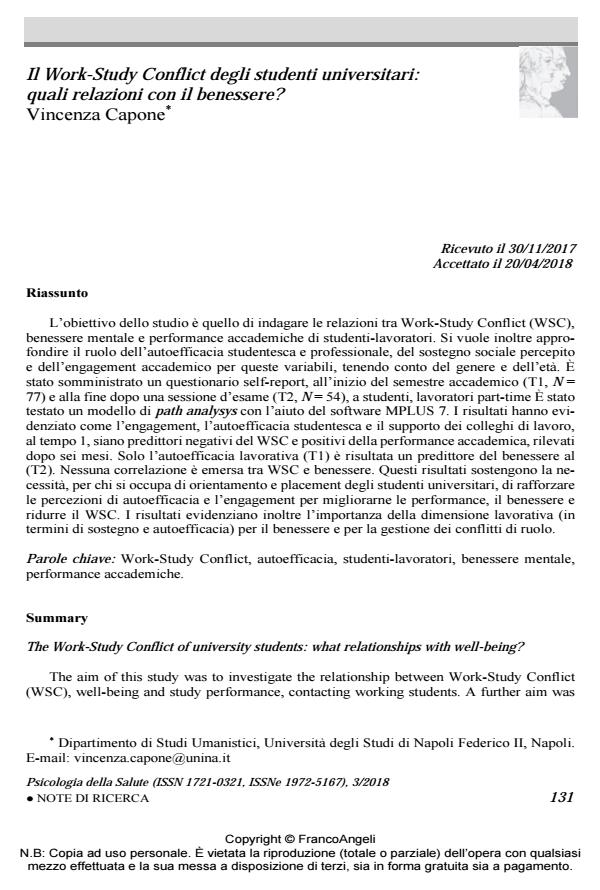Il Work-Study Conflict degli studenti universitari: quali relazioni con il benessere?
Titolo Rivista PSICOLOGIA DELLA SALUTE
Autori/Curatori Vincenza Capone
Anno di pubblicazione 2018 Fascicolo 2018/3
Lingua Italiano Numero pagine 14 P. 131-144 Dimensione file 280 KB
DOI 10.3280/PDS2018-003007
Il DOI è il codice a barre della proprietà intellettuale: per saperne di più
clicca qui
Qui sotto puoi vedere in anteprima la prima pagina di questo articolo.
Se questo articolo ti interessa, lo puoi acquistare (e scaricare in formato pdf) seguendo le facili indicazioni per acquistare il download credit. Acquista Download Credits per scaricare questo Articolo in formato PDF

FrancoAngeli è membro della Publishers International Linking Association, Inc (PILA), associazione indipendente e non profit per facilitare (attraverso i servizi tecnologici implementati da CrossRef.org) l’accesso degli studiosi ai contenuti digitali nelle pubblicazioni professionali e scientifiche.
L’obiettivo dello studio è quello di indagare le relazioni tra Work-Study Conflict (WSC), benessere mentale e performance accademiche di studenti-lavoratori. Si vuole inoltre approfondire il ruolo dell’autoefficacia studentesca e professionale, del sostegno sociale percepito e dell’engagement accademico per queste variabili, tenendo conto del genere e dell’età. È stato somministrato un questionario self-report, all’inizio del semestre accademico (T1, N = 77) e alla fine dopo una sessione d’esame (T2, N = 54), a studenti, lavoratori part-time È stato testato un modello di path analysys con l’aiuto del software MPLUS 7. I risultati hanno evidenziato come l’engagement, l’autoefficacia studentesca e il supporto dei colleghi di lavoro, al tempo 1, siano predittori negativi del WSC e positivi della performance accademica, rilevati dopo sei mesi. Solo l’autoefficacia lavorativa (T1) è risultata un predittore del benessere al (T2). Nessuna correlazione è emersa tra WSC e benessere. Questi risultati sostengono la necessità, per chi si occupa di orientamento e placement degli studenti universitari, di rafforzare le percezioni di autoefficacia e l’engagement per migliorarne le performance, il benessere e ridurre il WSC. I risultati evidenziano inoltre l’importanza della dimensione lavorativa (in termini di sostegno e autoefficacia) per il benessere e per la gestione dei conflitti di ruolo.
Parole chiave:Work-Study Conflict, autoefficacia, studenti-lavoratori, benessere mentale, performance accademiche.
- Il Work-Study Conflict degli studenti universitari: quali relazioni con il benessere? Vincenza Capone, in PSICOLOGIA DELLA SALUTE 3/2018 pp.131
DOI: 10.3280/PDS2018-003007 - University Student Mental Well-Being during COVID-19 Outbreak: What Are the Relationships between Information Seeking, Perceived Risk and Personal Resources Related to the Academic Context? Vincenza Capone, Daniela Caso, Anna Rosa Donizzetti, Fortuna Procentese, in Sustainability /2020 pp.7039
DOI: 10.3390/su12177039 - Psychological structure of personal resources of coping behavior of high school students Elena Suroedova, Galina Uvarova, Nogala Shevkieva, V. Kankhva, in E3S Web of Conferences /2021 pp.07090
DOI: 10.1051/e3sconf/202125807090 - Academic Community in the Face of Emergency Situations: Sense of Responsible Togetherness and Sense of Belonging as Protective Factors against Academic Stress during COVID-19 Outbreak Fortuna Procentese, Vincenza Capone, Daniela Caso, Anna Donizzetti, Flora Gatti, in Sustainability /2020 pp.9718
DOI: 10.3390/su12229718
Vincenza Capone, Il Work-Study Conflict degli studenti universitari: quali relazioni con il benessere? in "PSICOLOGIA DELLA SALUTE" 3/2018, pp 131-144, DOI: 10.3280/PDS2018-003007